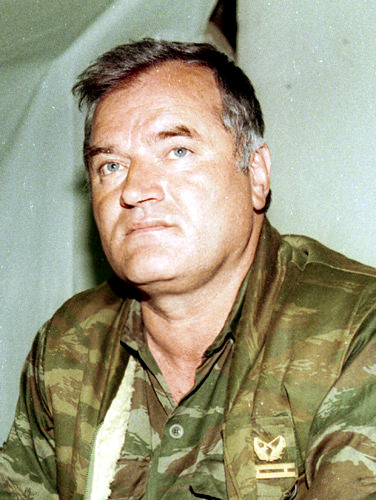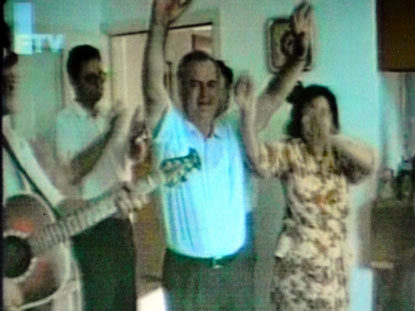Yesterday, a special court in The Hague convicted two Bosnian Serb military men of genocide for their part in the 1995 Srebrenica massacre. But the man who is believed to be the mastermind of the killings, General Ratko Mladic, remains at large. There hasn’t been much news about him since Bosnian TV showed a series of sensational home videos of him last year. They were not of recent vintage (they might have been filmed at any point between the time he went into hiding in the 1990s to the months before they surfaced), but they showed the world’s most wanted man moving about freely, playing ping pong, popping champagne corks, toasting friends, bouncing a grandchild on his knee, admiring the beauties of nature, even crying at a funeral. Despite the countless promises over the years by various governments in Belgrade that Mladic would be arrested shortly, and the many widely-publicized actions in which special police units were seen on television searching some building where he was supposed to be hiding, the man indicted on charges of genocide for organizing the July 1995 massacre of some 8000 Bosnian Muslim men in the Bosnian town of Srebrenic is still on the run.
After the capture of Radovan Karadzic two years ago, many expected that Mladic would be next. Yet nothing happened. In a recent episode of the program Most on Radio Free Europe/Radio Liberty, two well-informed Belgrade journalists, Milos Vasic of the weekly Vreme and Ljubodrag Stojadinovic, the former-columnist of the daily Politika, joined by their host Omer Karabeg, speculated about his whereabouts and the people who are protecting him.
Both journalists believe that Mladic is hiding in Belgrade. If attempts are still being made to locate him and arrest him, they are being done in secret. The publicized searches in the past, they suggest, were just a bit of theater for the sake of appeasing the EU, which Serbia would like to join. There are people in the government who are willing to turn him over to the International Criminal Tribunal for the former Yugoslavia in The Hague, but they will not say this publicly since their readiness to comply is not shared by the nationalist parties, a large segment of the public, and members of the intelligence services responsible for his capture. It appears that one reason Mladic is never found where he’s supposed to be hiding is that he’s tipped off by one of his pursuers. Despite the firing in recent years of high and low-ranking officials from intelligence services who were implicated in various unsavory activities, these men still have contacts on the inside and are able to offer Mladic logistical support.
Even the dependable professionals who are now in charge of the department lack the power to break the ties between Mladic and former and present intelligence officers, since they are all closely connected through the numerous crimes in which they participated during the bloody Milosevic years and they will continue to protect each other and the politicians who sponsored them in the foreseeable future. Government leaders, too, claim that the arrest of Mladic would destabilize the country at the time when it has far more urgent issues to address. This, of course, is the same argument that President Obama uses for not prosecuting crimes of the previous administration. In my view, the real reason prosecutions have been avoided in both countries is that the political elites and the military establishment have something to fear from such an inquiry into the past. Interestingly, the two journalists don’t say anything about the army— Mladic’s protector in the past—save for a passing remark about many dissatisfied officers whose sympathies, one would imagine, would be with their former hero. In the end, all of these arguments for doing nothing in Belgrade and Washington are just cowardly excuses.
Mladic, according to Vasic, has probably changed his appearance, but unlike Karadzic, who disguised himself as a New Age guru and appeared in public without being recognized, the general most likely lives a life of a quiet retiree, carrying groceries from the market and playing chess with other old men. Stojadinovic doesn’t agree. He thinks that Mladic, who has always been a reckless ego-maniac, someone who regarded himself as a messiah when he commanded his troops in Bosnia, would never change his name. Over the years, there were rumors that he had a heart attack, a stroke, or some unspecified disease that would kill him soon, but both Vasic and Stojadinovic don’t give them much credence. Nor is there a chance that Mladic would give himself up or that he would kill himself. Military men of his type rarely lose any sleep over the slaughter they’ve caused. Genuine remorse is more often encountered among ordinary soldiers.
Advertisement
The people in the government who want to arrest Mladic most likely have a rough idea where he is. They hope that with time his name will fade from public memory a bit, so that his arrest won’t cause as much of a stir. Of course, they wouldn’t mind if he dropped dead and solved the problem for them that way. Judging by his hale appearance in the home videos, they will have to wait. In the view of the two journalists, whatever happens next will not happen soon. Still, one must not forget that, despite enormous domestic political pressure not to lift a finger, Serbia has arrested and turned over to the Hague tribunal Milosevic, Karadzic, and scores of others. So I would not give up hope about Mladic yet.



